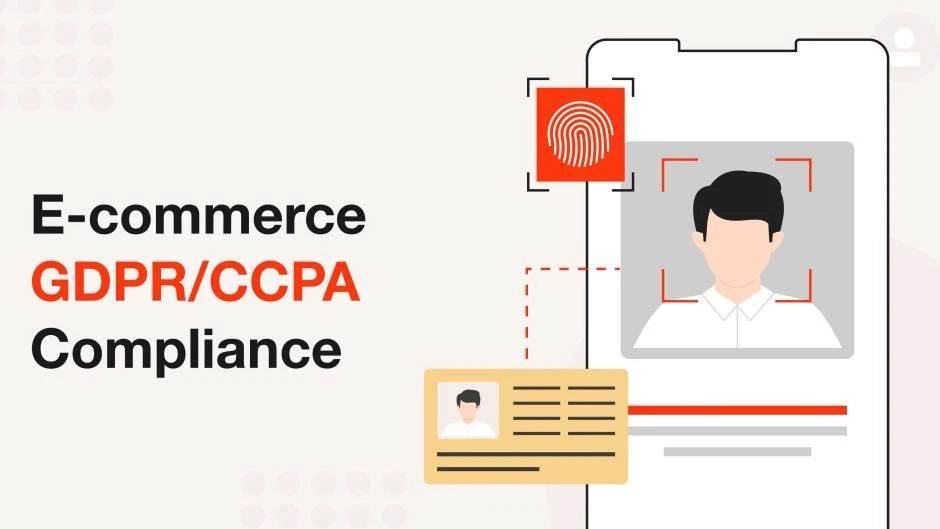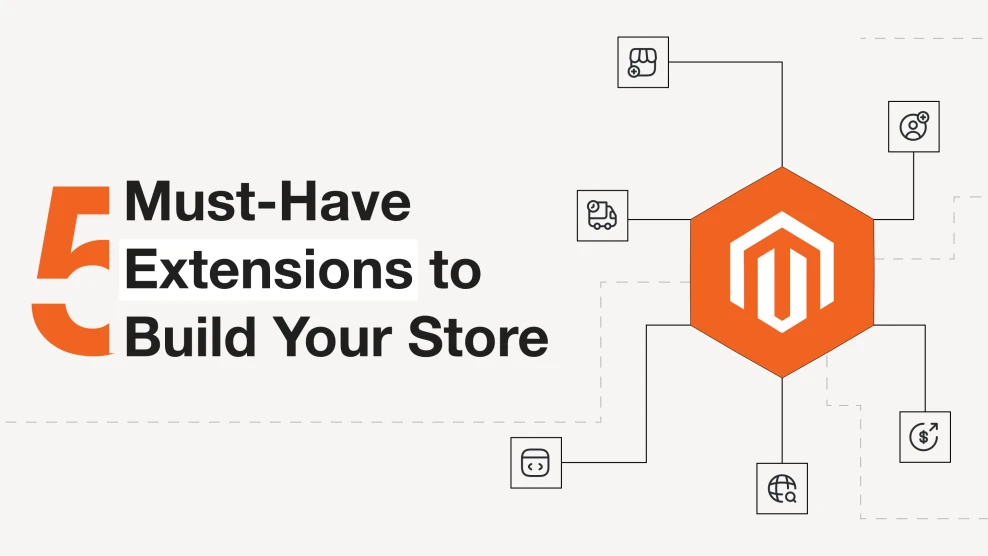Magento 2 GDPR Compliance: How to Manage Customer Data Securely
-
 Andriy Kovalenko
Andriy Kovalenko
- E-commerce Tips & Best Practices
- Feb 18, 2025
- 9 min read
Disclaimer: The author is not a legal expert, and their advice should not be considered legal counsel.
In 2023, the EU fined Facebook (Meta) for violating the General Data Protection Regulation (GDPR) by transferring user data from Europe to the U.S. The fine amounted to $1.2 billion.
Violating digital privacy regulations doesn't always result in expenditure of that amount. However, how you handle your customers' personal data and whether you comply with GDPR directly impact their trust in you.
In this article, we'll explore the best practices for collecting, processing, and protecting customer information in online stores, and how the Magento 2 GDPR extension helps you do it.
Table of Contents
- Why personal data protection is important for Magento 2 GDPR and CCPA compliance
- 6 Principles of data collection and processing for GDPR and CCPA implementation
- How to comply with GDPR or CCPA and properly obtain customer consent for data collection
- Managing Customer Consent: GDPR & CCPA Compliance Checklist
- Automated data processing via Magento 2 GDPR extension
- Data security: how to protect your users' personal data in compliance with GDPR or CCPA
- Conclusion
Why personal data protection is important for Magento 2 GDPR and CCPA compliance
Everyone wants to feel safe and protect themselves from unlawful actions. Online store visitors are no exception. However, to make a purchase, they must provide their personal data—at the very least, their name, contact details, and shipping address.
Neither GDPR nor CCPA (California Consumer Privacy Act)—the key regulations governing personal data handling—provide an exhaustive list of what qualifies as personal data. However, it generally refers to any information that can be used to identify an individual. This includes not only names and phone numbers but also IP addresses, social media accounts, and more.
E-commerce GDPR compliance directly impacts customer trust in your business. Additionally, store visitors should clearly understand what personal data is required to complete a purchase. That's why it's essential to inform customers about:
- How their personal data will be processed, including collection, storage, transfer, anonymization, and more.
- To whom their personal data may be transferred, along with the purpose and legal basis for such sharing.
- How long their personal data will be stored.
- Under what conditions they can withdraw their consent for data processing and what consequences this may have.
Next, we'll explore the necessary steps to ensure compliance and how additional tools, such as our Magento 2 GPPR extension, can help you stay in the legal field.
6 Principles of data collection and processing for GDPR and CCPA implementation
The basic principles for collecting and processing personal data that online stores must follow are reflected in GDPR and CCPA. There are six of them in total:
- Lawfulness, fairness, and transparency. Users must give consent for data collection and processing. In doing so, they should clearly understand what they are agreeing to. As an online store owner, you must provide a privacy policy and display a consent banner.
- Data minimization. You should collect only the data necessary to achieve a specific purpose. For example, you need contact details to communicate with the customer about their order. The reasons for collecting each type of data should also be specified in the privacy policy.
- Purpose limitation. Data collected for a specific purpose must be processed only for that purpose, and nothing else.
- Accuracy. Data must be accurate and kept up to date. If the data is inaccurate, it must be corrected, or deleted immediately.
- Storage limitation. Storage periods should align with the purpose of data storage. Once the purpose is achieved (e.g., the product is delivered and no further interaction is expected), the data should be deleted.
- Integrity and confidentiality. You must protect your customers' data—both from illegal processing and from accidental data leakage and destruction.
It sounds simple, but in practice, implementing the GDPR principles can be difficult. For example, a store may obtain user consent but not keep a record of when and what the user agreed to. Or, inactive user data may be stored for years.
This is not surprising, as manually tracking all these aspects requires significant resources. Instead, automation through additional tools simplifies these processes. Here's a closer look at how this works in the Magento 2 CCPA extension.
How to comply with GDPR or CCPA and properly obtain customer consent for data collection
Privacy policies and personal data information agreements don't have a strictly defined format. The main thing is that they clearly state what information you collect and how you will use it. However, there can be many legal nuances. Data protection laws may vary from country to country—even within the EU and between individual U.S. states.
For example, in France, compliance with GDPR means online stores must include a screen-blocking feature to ensure clear user consent. In Brazil, all text displayed to customers must be translated into the regional language.
If a company is registered in the U.S. but serves customers in the EU, its store's functionality must comply with EU regulations.
To ensure your privacy policy and personal data information agreement align with the legal requirements of a specific country, it's best to consult a legal expert.
But there's also the technical side and process management to consider. Users from different countries or regions must see the appropriate consent form. Suppose your online store operates in multiple countries—each with its own legal requirements for consent formatting. Implementing this can be quite challenging.
This is where a Magento 2 Cookie Consent extension can help by automating the process. You simply define the specific countries in the Cookie Consent settings. Then, when a new user visits your site, the module detects their location via IP and displays the correct consent banner.
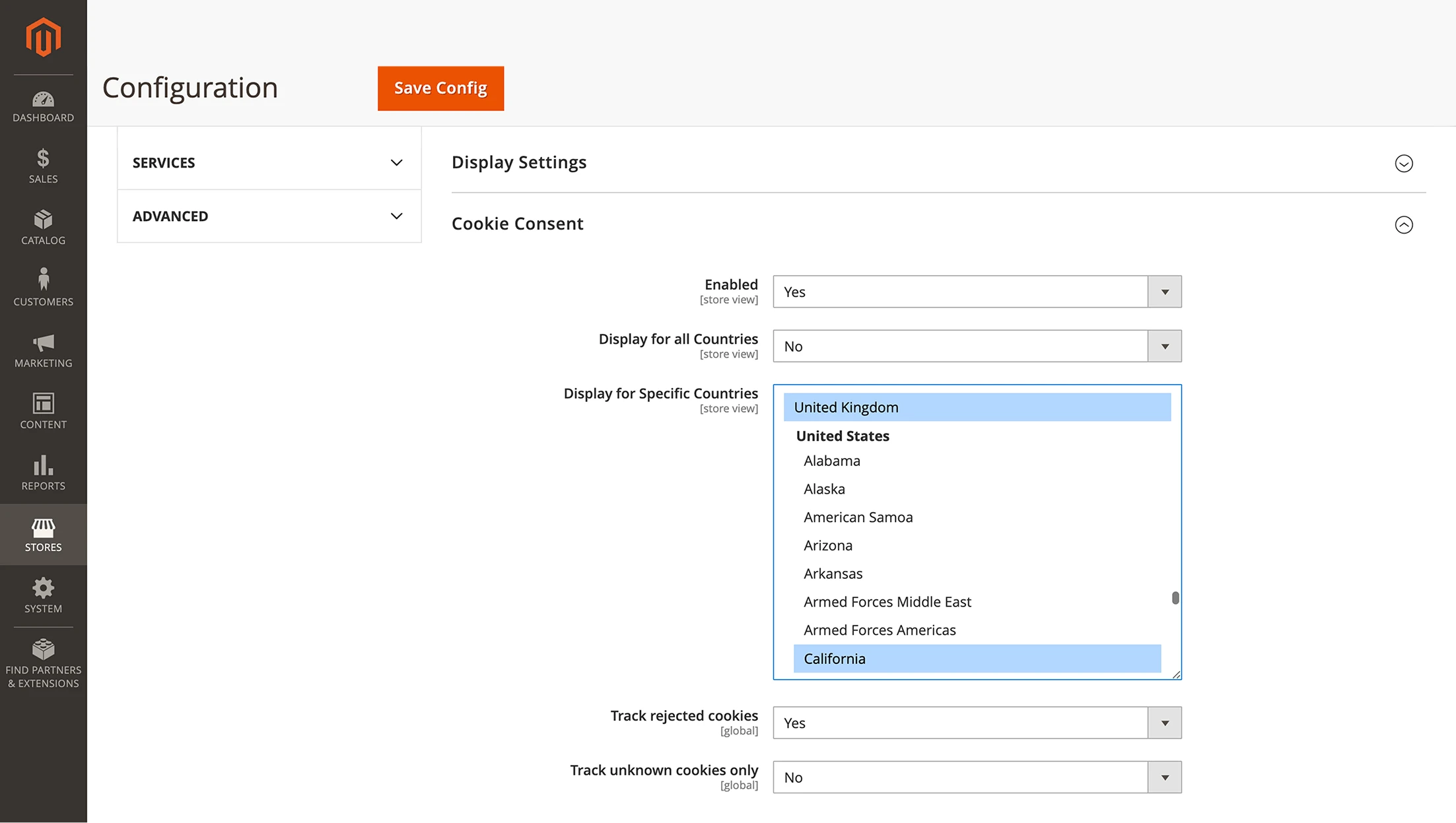
Our extension also supports multistore environments, allowing you to create different banners for different stores and configure their display based on the customer's country. Outside the EU—for example—consent requirements are generally less strict, so the banner can be optional and customized for each region.
However, regional GDPR requirements aren't the only factor to consider when handling personal data. Consent requests may also be necessary in other scenarios.
Here are just a few examples:
- Subscribing to special offer newsletters
- Agreeing to return policies or product warranties
- Confirming age when viewing 18+ products
In each of these cases, just like with cookie consent or privacy policies, you must ensure clear and explicit user consent. The Magento 2 GDPR module includes a feature that allows you to create custom checkboxes, making it easier to manage various consent requirements.
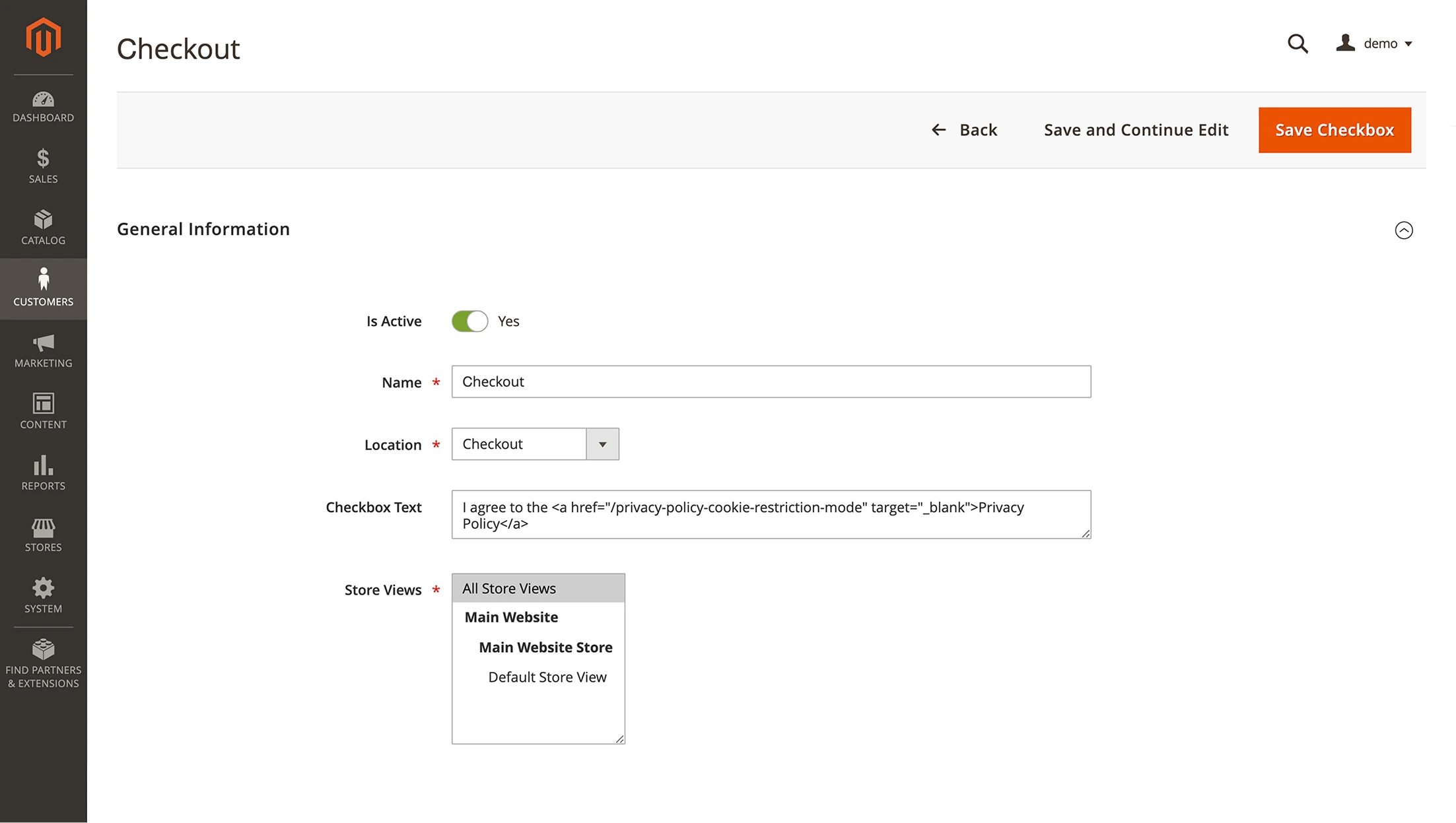
In the Google consent section, you can set up consent to the transfer of data to Google Analytics.
The module's functionality allows tracking customer consent or lack of interaction with the banner across different cookie groups and ensures their transmission to Google Tag Manager (GTM).
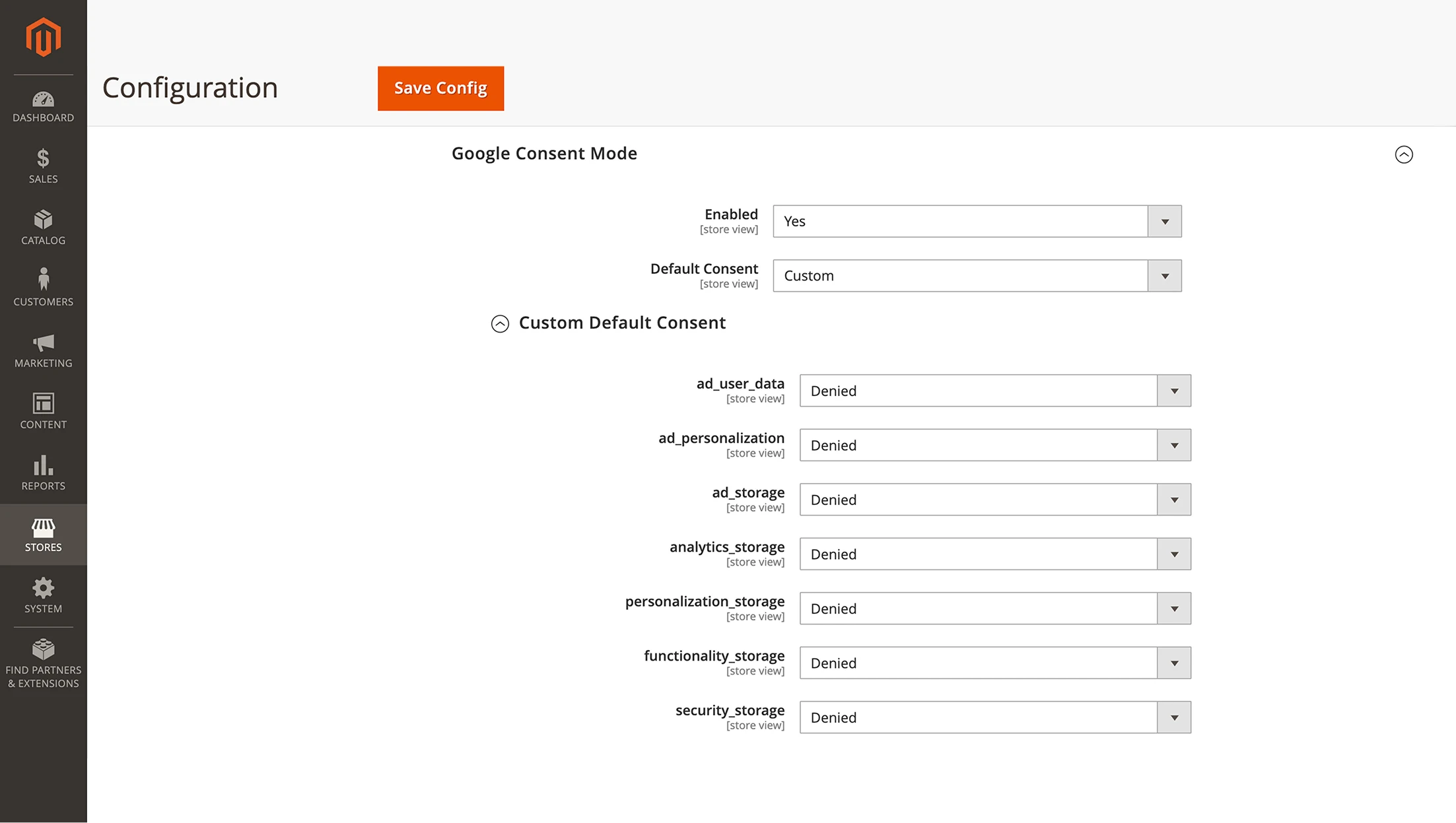
Based on the consent provided by the user, the system will transmit parameters to GTM, ensuring that customer data is processed in accordance with their will for a specific store.
Managing Customer Consent: GDPR & CCPA Compliance Checklist
All customer GDPR consents are stored in one place and include information about the date, status, type of consent, as well as the customer's name and a link to their account in the Magento store. This allows you to manage them very quickly and conveniently: for example, to get information about consents and view the customer's data.
Anonymization or deletion is usually done in two cases:
- When the client's data is no longer needed. For instance, if the account has been inactive for a certain period or the data storage period has expired (for both registered and guest customers).
- When a client requests anonymization or deletion because they no longer want their data to be stored.
Why is anonymization used instead of simply deleting data? Imagine a user registers, makes a purchase, and then deletes their profile. According to regulations, you can no longer store their data. However, their information is still part of an order, which you cannot delete because it is financial and legal reporting.
In such cases, customer data is anonymized—replaced with fake data that prevents identification.
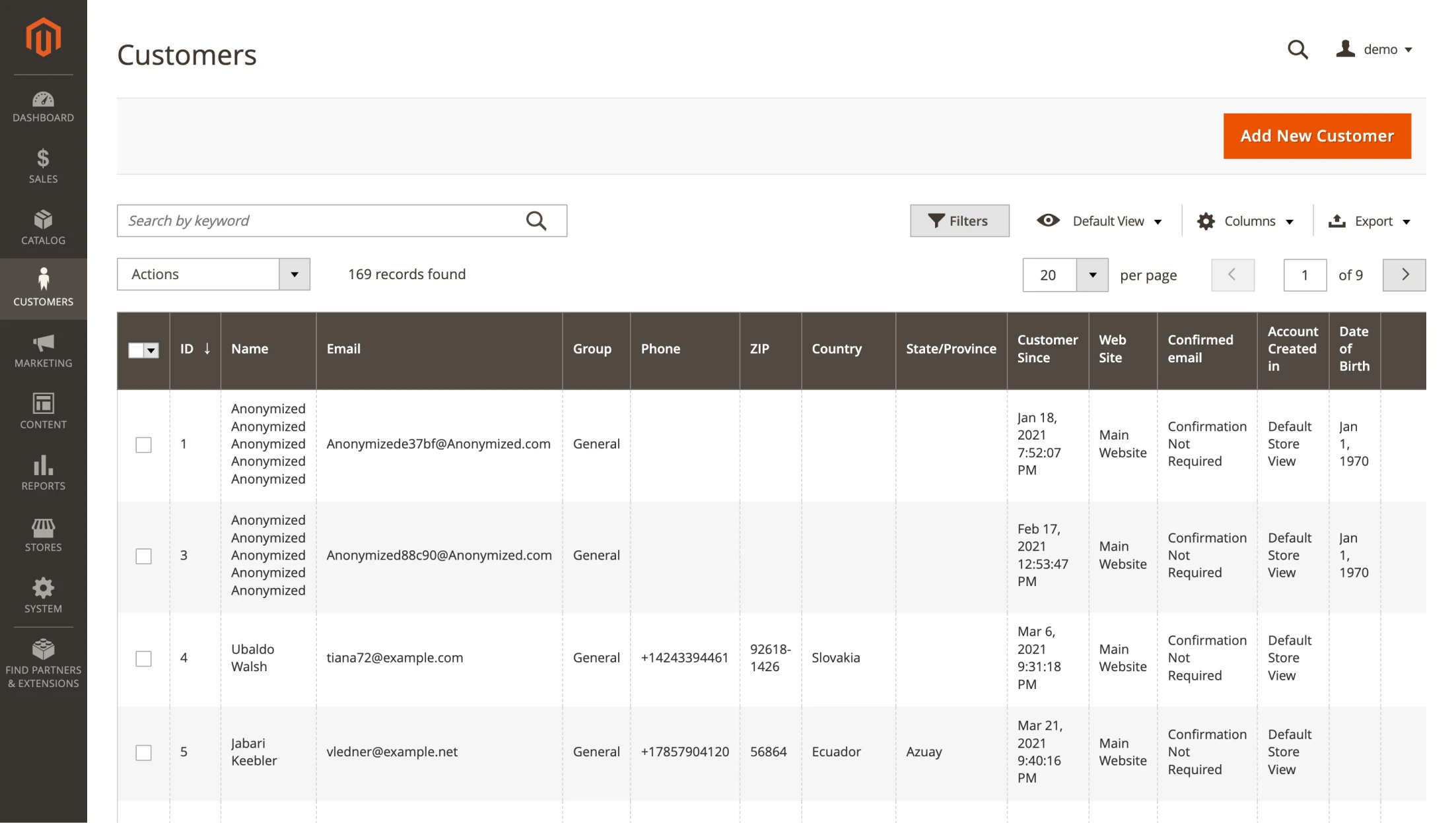
Pay attention! There is also pseudonymization, where data is encrypted and can be restored. However, in our module, anonymization works differently. The system rewrites data as "anonymous," and it is an irrevocable change. This approach protects sensitive information in case of a possible data leak.
To help customers understand what data is stored (so they can decide whether they want it to remain), you can provide an option to download their personal information. GDPR module offers this feature as well.
By the way, in some regions, such as California, adding such functionality will be mandatory.
Automated data processing via Magento 2 GDPR extension
Customer requests are processed manually by store employees. However, the deletion of abandoned account data can be automated. The GDPR and CCPA do not specify that this should be done in this way. However, this is a very convenient feature that is available in the GDPR extension and will greatly simplify and speed up your work.
Here's how it works.
In the settings, you specify the number of days after which the module should automatically delete data if a user has not logged into their account. Once this period expires, the information is cleared without any employee involvement.
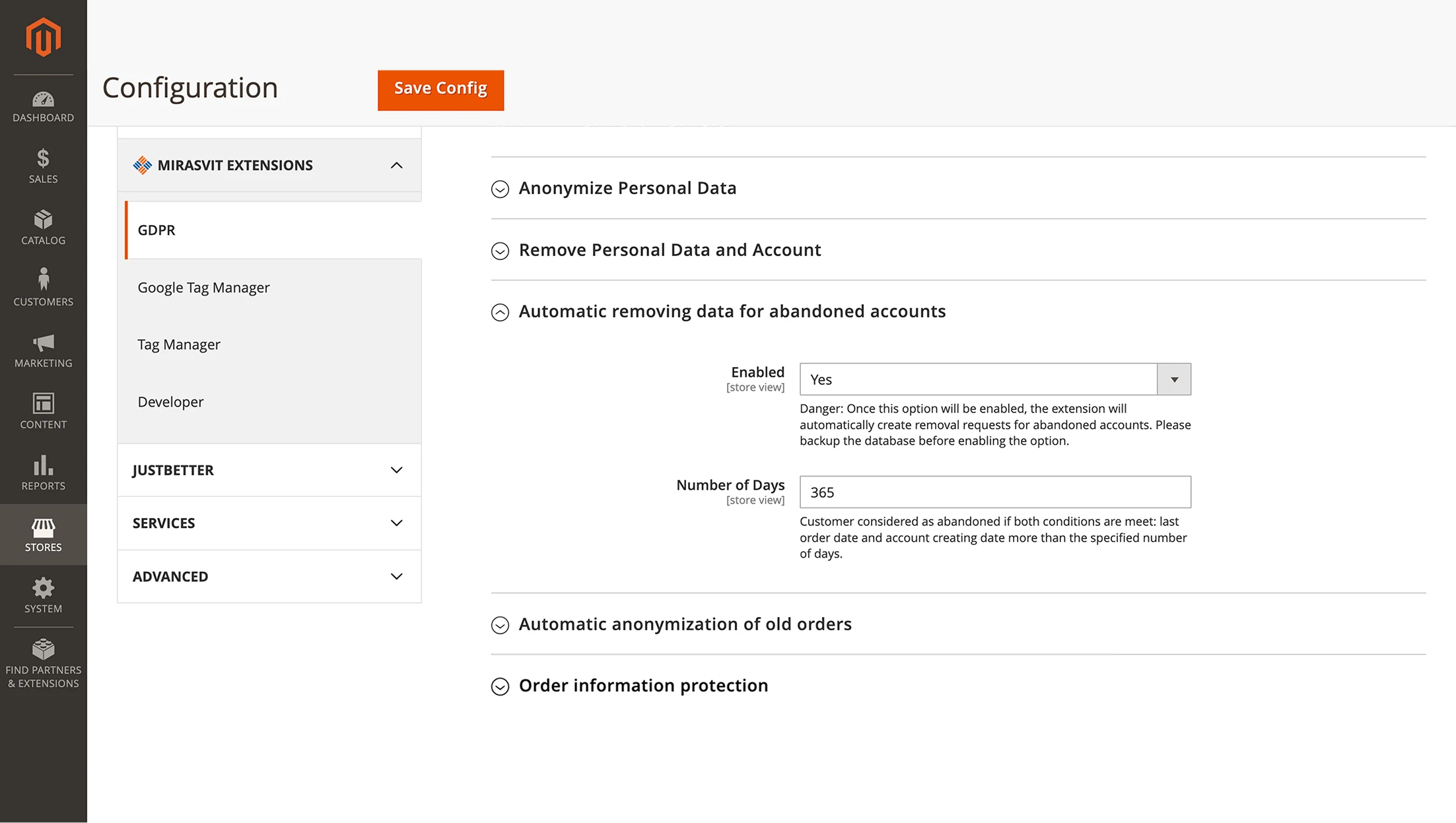
Important! Before setting a particular number in the settings, it is recommended to consult a legal counsel. It is also worth clarifying whether it is necessary to notify the customer that their data will be deleted.
By the way, data anonymization, which we discussed a little earlier, can also be automated. For example, customers can request anonymization, and instead of an administrator processing it, the system will handle it automatically. Fewer manual operations mean more time for other important tasks.
Data security: how to protect your users' personal data in compliance with GDPR or CCPA
The most common risks associated with personal data in online stores primarily relate to its processing. It can be:
- Human factor. Those employees who are not qualified enough may intentionally or accidentally collect data without user consent, share it with third parties, fail to process data deletion requests, etc.
- Technical vulnerability. Insufficient protection of the website and servers, etc.
Employees play a key role, as the store's operations depend on the people managing it. To avoid risks, hire professionals who undergo regular training on handling personal data. Also, you (together with an in-house or external legal advisor) should write clear internal data processing procedures and audit their implementation.
Automation of certain GDPR implementation processes with additional tools can also help reduce risks related to human error.
As for the technical side, Magento itself has a mechanism for protecting confidential information. That is: the platform architecture prevents site visitors from accessing sensitive areas of the file system through the browser.
But to be as protected as possible, you need to update the software on time. This includes core Magento updates as well as updates for any additional modules, as they contain patches that fix newly discovered vulnerabilities.
Conclusion
Protecting personal data is not just a legal requirement—GDPR compliance strategy is a matter of customer trust. However, manual management of these processes creates risks such as incorrect consent settings, missed data deletion deadlines, and human errors in processing requests.
The Magento 2 GDPR module automates these processes, allowing you to:
- Automatically detect the user's region and show the appropriate consent forms.
- Store a complete history of all consents.
- Timely delete outdated data.
- Minimize the human factor.
This not only reduces the risk of violations and fines but also saves your online store's resources—allowing you to focus on business development.
This must-have extension allows your online store to comply with the most common GDPR (General Data Protection) & CCPA (California Consumer Privacy Act) regulations and guidelines for user data protection, CNIL and LGPD standards. Our GDPR module for Magento 2 is enriched with features to ensure the security of customer data, increase trust and transparency in data processing, and make your online business compliant with the law.
Get in-depth reports on your customers' behavior while they are shopping using our Google Analytics 4 with GTM extension.
Utilize this module to integrate eCommerce Tracking with Google Analytics 4 and identify bottlenecks in the shopping process within your store.

